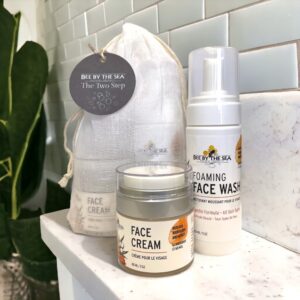Natural skincare products offer a multitude of benefits, harnessing the power of botanical ingredients for a healthy glow. However, unlike their commercially produced counterparts packed with preservatives, natural products have a shorter shelf life. This guide unveils the secrets to maximizing the lifespan of your favorite natural skincare products, ensuring you reap their benefits for longer.

Understanding Natural Product Shelf Life
Natural skincare products lack the synthetic preservatives found in conventional options. These preservatives combat bacteria, mold, and yeast growth, extending product shelf life. Without them, natural products are more susceptible to spoilage. The specific shelf life of a natural product depends on several factors:
- Ingredients: Products with water or high water content (aloe vera, hydrosols) have a shorter shelf life due to increased microbial growth potential. Oils and butters generally last longer.
- Processing: Cold-pressed oils and raw ingredients tend to have a shorter shelf life compared to those that undergo additional processing steps.
- Packaging: Airtight containers with pumps or dispensers minimize product exposure to air and contamination.
Hygiene is Key: Practices for Preserving Natural Skincare Products
Maintaining a clean environment is crucial for extending the shelf life of your natural skincare products. Here are some key hygiene practices to adopt:
- Clean Hands: Always wash your hands thoroughly with soap and water before using any skincare product. Germs and bacteria on your hands can easily contaminate the product.
- Utensils: Avoid dipping fingers directly into jars or containers. Use clean spatulas or spoons to scoop out product, especially for creams and masks.
- Storage Containers: Keep containers tightly closed after each use. Leaving them open allows air and potential contaminants to enter.
- Cleaning Surfaces: Wipe down counters and surfaces where you use your skincare products regularly to prevent the spread of bacteria.
Water Alternatives and the Power of Antioxidants
Water is a common ingredient in many natural skincare products. However, tap water can harbor bacteria that shorten shelf life. Here are some alternatives:
- Distilled Water: This water has undergone a purification process to remove impurities, making it a safer option for DIY skincare products.
- Boiled Water: Boiling water for at least one minute eliminates most bacteria. Allow it to cool completely before using.
- Herbal Infusions: Consider using herbal infusions made with witch hazel or green tea instead of water. These offer some natural antibacterial properties and add a touch of therapeutic benefit.
While not technically preservatives, antioxidants can play a role in extending shelf life. These natural compounds fight free radicals that can damage ingredients and shorten product lifespan. Look for natural skincare products containing ingredients like vitamin E, green tea extract, or rosemary extract.
Storage Strategies for Optimal Preservation
Proper storage plays a vital role in preserving your natural skincare products. Here are some key storage tips:
- Cool and Dark: Store your products in a cool, dark place away from direct sunlight and heat. Heat can accelerate product degradation. Bathrooms with fluctuating temperatures and humidity are not ideal.
- Refrigeration: Consider storing products containing water or with a shorter shelf life in the refrigerator, particularly after opening.
- Travel-Sized Containers: If you must take your products on the go, decant small amounts into travel-sized containers to minimize exposure to air and contamination.
Knowing When to Let Go: Recognizing Spoilage Signs
Even with proper storage and hygiene practices, natural products will eventually spoil. Here are some signs to watch out for:
- Change in Consistency: If a cream or lotion becomes lumpy or separates, it’s likely gone bad.
- Discoloration: A change in color, especially a darkening or dulling, can indicate spoilage.
- Off Odors: An unpleasant or rancid smell is a clear sign that the product has gone bad and should be discarded.
Conclusion: Embrace the Freshness of Natural Skincare
By following these tips, you can significantly extend the shelf life of your natural skincare products, ensuring you enjoy their benefits for as long as possible. Remember, natural products are free from harsh chemicals and preservatives, offering a gentler approach to skincare. Embrace the freshness of natural ingredients and prioritize proper hygiene and storage to keep your botanical beauty routine flourishing.
